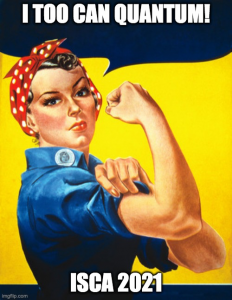In the three years since our first quantum computing Sigarch blog post, there have been considerable disruptive advancements across the quantum computing stack, coupled with widespread increase in enthusiasm across the classical community. On the technological advancement front, we are poised to reach over 1000 qubit superconducting quantum machines by 2023, multiple quantum technologies are making promising progress, real-world chemical reactions are being efficiently simulated, multiple vendors are providing quantum machine access in the cloud, and new startups are on the horizon. These recent developments are just the beginning. Never far behind, the architecture community has made promising growth in quantum computing endeavors across the still evolving quantum computing stack, including prominent publications across architecture and systems conferences in the past few years – some of which we will highlight. Toward the end of this post, we will highlight a ISCA 2021 workshop intended to get more architects involved in these efforts.
The long and winding road
There have been exciting breakthroughs during the NISQ era, but to reach the full promise of quantum-accelerated chemical simulation, data processing, and code cracking, large-scale and preferably fault-tolerant quantum computers are required [Preskill2018]. Refining algorithms, devices, and processes is still necessary to unlock the computational advantages of quantum information processing. Unfortunately, it is anticipated that the demand for a quantum workforce to pursue these goals, will greatly outweigh the supply in the near term. It is of critical importance that quantum computing frontiers continue to advance as we are on the verge of quantum capability leading to better drug discovery, new nanoscale materials, acceleration of scientific exploration, as well as more accurate weather prediction and efficient food production. Moreover, as end-to-end quantum solutions continue to mature, it is imperative to assemble a workforce composed of a diverse sample of the computing community as expanding diversity and inclusion will continue to advance quantum in both the academic and industrial setting. In this regard, the NSF and the White House OSTP are actively engaged in educating, growing and sustaining a qualified workforce of various specialized fields for the advancement of Quantum Information Science and Technology.
Classical inspiration, support and control
From a research perspective, talent has to be cultivated from the classical fields of science and engineering, especially because many classical problems still appear on the roadmap to scalable quantum technology. For example, opportunities to advance quantum technology by electrical engineers includes improved electronic control mechanisms, by computer scientists includes smarter compilers for optimum hardware use, and by material scientists includes refined device fabrication techniques. This non-exhaustive list merely begins to scratch the surface. Directly or indirectly, classical computing ideas are applicable to the quantum world, allowing for contributions from scientists and engineers who may not be fully trained in the fine details of quantum mechanics. Computer architects are especially critical to this endeavor as they are adept at bridging the information gap between different layers of the computing stack and are well poised to apply their cross-layer experiences from classical computing to the quantum domain. Some areas of classical computing inspired/dependent quantum advancement include:
- Classical processing (potentially cryogenic) support for quantum challenges,
- QC compilation in a technology-aware manner, targeting qubit mapping, gate scheduling etc.
- Refining fabrication techniques,
- Resource constrained system design (power consumption, chip size etc.),
- Improving control/readout,
- Distributed quantum computing challenges and communication barriers,
- Verification methodologies,
- Virtualization / memory management,
- Enabling control-flow / ISA / Microarchitecture,
- Quantum simulation,
- Optimizing compilation / designing controllers and FSMs for hybrid classical-quantum algorithms,
- Classical support for scalable quantum computing.

I too can Quantum! (I2Q)
While educating classical computing experts and novices in the deeper mathematics and physics of the quantum world is challenging, enabling them to think about quantum from the perspective of classical computing control for quantum computing is more conceivable. In this spirit, we are organizing the “I too can Quantum!” (I2Q) workshop at ISCA 2021. I2Q is focused on recognizing and mentoring innovative PhD students across a broad range of technical research areas, with a goal of contributing towards and furthering quantum research. I2Q will enable graduate students with a solid classical foundation, a passion for quantum computing and preliminary ideas in a specific quantum domain to be mentored by quantum experts from academia, industry and national labs and support them in their quest towards achieving their research goals. The goal of this workshop is to help students think about a nascent quantum problem/idea in an holistic manner and communicate those ideas to the wider quantum community so that we can provide valuable early-stage feedback and mentorship, hopefully leading to long-term collaborations. We hope that classically-trained students will benefit from this workshop and can confidently say, “I too can Quantum!”.
Students will submit a proposal on any innovative idea targeting quantum computing and are encouraged to seek ideas inspired from their own classical computer architecture expertise. I2Q will carefully review submitted proposals based on their potential for quantum innovation and solidity in (classical) foundation and select the I2Q finalists. The I2Q finalists will be mentored by quantum experts over a 5-6 week period prior to the ISCA workshop to facilitate the successful formulation of the proposed research. The finalists will present their maturing research proposals at the I2Q workshop. Further, we will strongly encourage the continuation of these research partnerships beyond the workshop scope and timeline.
Submissions are encouraged in quantum computing directions inspired by (but not limited to) computer architecture ideas such as: Compilation, Scheduling, Approximate Computing, Error Correction, Verification, Design Automation, Simulation, Parallelism, Memory Management, Edge Computing, Distributed Computing, Heterogeneous Co-processing, Security, Communication, Benchmarking, Ultra-low Power/Temperature Computing, Modularity, Microarchitecture, Integration vs Abstraction, ISA. Details about the workshop will be available at EPiQC I2Q website and initial deadlines are expected in mid-March.
To foster early-stage interest, please refer to some foundational material below.
- Quantum Computing EdX and other lectures
- Introduction to Quantum Computing
- Tutorial: Grand Challenges and Research Tools for Quantum Computing
- Workshop: Grand Challenges and Research Tools for Quantum Computing
- Building a Quantum Workforce
- Quantum Computer Systems: Research for Noisy Intermediate-Scale Quantum Computers (Synthesis Lectures on Computer Architecture)

About the Authors:
Gokul Subramanian Ravi is a 2020 Computing Innovation Fellow, pursuing a postdoc in the CS Department at the University of Chicago as part of EPiQC. His research targets “Architecting Classical Control for Near-term Quantum Systems”, mentored by Prof. Fred Chong. He received his PhD in Computer Architecture from the ECE Department at UW-Madison and was advised by Prof. Mikko Lipasti.
Kaitlin N. Smith is a CQE/IBM Postdoctoral Scholar within EPiQC at the University of Chicago under the mentorship of Prof. Fred Chong. Her current research involves technology-aware quantum programming and high-dimensional quantum processing. She graduated with a PhD in Electrical Engineering from Southern Methodist University in December 2019.
Fred Chong is the Seymour Goodman Professor of Computer Architecture at the University of Chicago. He is the Lead Principal Investigator of the (Enabling Practical-scale Quantum Computation), an NSF Expedition in Computing and a member of the STAQ Project.
Many ideas from this blog stem from conversations with the rest of the EPiQC team: Ken Brown, Ike Chuang, Diana Franklin, Danielle Harlow, Aram Harrow, Andrew Houck, John Reppy, David Schuster, and Peter Shor.
Disclaimer: These posts are written by individual contributors to share their thoughts on the Computer Architecture Today blog for the benefit of the community. Any views or opinions represented in this blog are personal, belong solely to the blog author and do not represent those of ACM SIGARCH or its parent organization, ACM.


